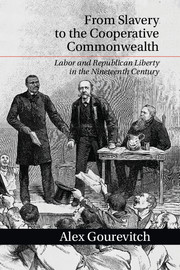Book contents
5 - Solidarity and Selfishness
The Political Theory of the Dependent Classes
Published online by Cambridge University Press: 05 December 2014
Summary
The Knights have learned that they are powerless to accomplish anything individually, and so labor for their whole class. It is the correct idea – Solidarity.
It will sweep all systems based on individual selfishness out of existence.
Maud, Breaking the ChainsIn 1826, Langdon Byllesby wrote, “history does not furnish an instance wherein the depository of power voluntarily abrogated its prerogatives, or the oppressor relinquished his advantages in favour of the oppressed.” A year later, Byllesby’s fellow Worky, William Heighton, explained the formation of the Working Men’s Party of Philadelphia on the same grounds. Workers “are beginning to discover, that from themselves alone, all their help must come.” Throughout the nineteenth century, labor republicans would return to this political sentiment. In 1865, William Sylvis reminded his audience of iron-molders that “all popular governments must depend for their stability and success upon the virtue and intelligence of the masses ... tyranny is founded upon ignorance, and liberty upon education.” If popular governments required an educated and virtuous public, it was the working majority’s task to organize and educate itself. Sylvis continued, “without an effort on the part of the masses themselves, their condition must forever remain the same ... an effort to be successful must be a united one.” Two decades later, the anonymous author of “Industrial Ideas” in the Journal of United Labor wrote, “let us not boast of liberty if we require politicians to advise us, governments to tax us, bosses in order to produce, merchants to exchange our products. If we are slaves, we must learn to live without masters. Let us be our own government, our own capitalist, our own employer, or liberty will forever be a delusion-never a reality.”
- Type
- Chapter
- Information
- From Slavery to the Cooperative CommonwealthLabor and Republican Liberty in the Nineteenth Century, pp. 138 - 173Publisher: Cambridge University PressPrint publication year: 2014



